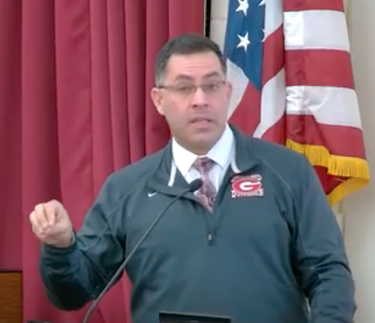Teaching social studies has shifted from ‘factoids’ to inquiry, says GCSD leader
GUILDERLAND — Barry Alex Finsel likened the way history used to be taught to the television game show “Jeopardy!” where students learned names, dates, and places — “random factoids.”
“The current incarnation of history is about the application of skills,” Finsel told the Guilderland School Board on Tuesday. Finsel is the district’s instructional administrator for social studies, English, the library, and reading.
Students now are taught to use inquiry and inductive reasoning, he said, to interpret sources.
“I have to emphasize this source part,” Finsel said, “because that is probably the most important thing in a practical application today. Whether a student is watching the news on MSNBC or Fox News, it’s about framing the information to understand how it’s presented so that you can always get a kernel of truth, no matter where you’re going.”
He went on, “Nobody is 100 percent objective, right? In reality, everyone has a degree of bias.”
Over the last decade, there has been a shift in how social studies is taught, he said.
Formerly, he said, students could get by knowing Civil War dates; they didn’t have to understand “who was Lincoln writing to with the Emancipation Proclamation and what was his purpose, and what language he used.”
Although the Board of Regents, which governs education in New York state, has proposed doing away with the standardized tests called Regents exams, Finsel said, “The Regents exam is not perfect but it is a benchmark.”
He displayed a chart, showing that Guilderland students had continued to do well on the global history exam, with a passing rate usually above 90 percent, as the state moved from a traditional approach, transitioning to a new framework.
Statewide, during the transition, exam passage had plunged to 62 percent in 2029. The pandemic intervened before the new framework global history Regents was given again in 2022, when 93 percent of Guilderland students passed compared to 80 percent statewide.
The pattern was similar for the Regents exam in United States history. The passage rate for Guilderland students peaked at 99 percent in 2016, with the traditional exam but has stayed above 90 percent with the new framework after the pandemic hiatus.
Statewide, the passage rate before the new framework ranged from 84 to 77 percent and after the transition ranged from 80 to 78 percent.
“We did really, really well,” said Finsel, adding, “We did not wait for these changes to happen … we were working on skill development way ahead of time.”
The Regents exams in history are now similar to those for English, Finsel said, as they focus on reading and writing.
“It’s not about the names, dates, and places,” he said. “It’s about absorbing information, processing it, and expressing it in ways that are efficient.”
From the department’s point of view, he said, “It’s not just about tests; it’s about the learning experience.”
Over the past decade, Finsel said, the district has partnered with two local community colleges — Hudson Valley and Schenectady — so students can get college credit for courses while still in high school, saving them time and money later.
“If they get a college start now,” he said, “they’re more likely to continue and finish up with a college degree.”
He also described co-teaching, in which social studies teachers are paired with English teachers or special-education teachers, as a boon.
Collaboration has led to innovation, he said, without “external experts” or textbooks.
“All this stuff has been locally homegrown by our talented teachers, and the key ingredient is providing time and space for people to work together,” he told the board, which is on the cusp of participating in the development of next year’s budget.
Seal of Civic Readiness
“A brand spanking new thing” is a program where Guilderland students who aspire to be teachers can earn points towards getting the state’s Seal of Civic Readiness while earning college credit through the University at Albany.
“We are one of five schools in New York state who has the ability to do this for our kids,” said Finsel.
Jonathan Ouckama, a remedial reading teacher at the high school who works with social studies teacher Tyler Lutjen, said helping students work on civic readiness is the highlight of his day.
The high school students write lesson plans to teach younger students about “issues like self-esteem, bullying prevention, decision-making, the impact of digital technology and social media, diversity and tolerance,” he said.
“They are doing some research through our library … They are designing and getting ready to implement some of these lesson plans for our elementary-school students,” said Ouckama.
He went on about the students participating in the civic-readiness program, “They’re building leadership skills, they’re building teamwork skills …. It is authentic; it is inspiring … It is the bright part of my day to work with Teacher Corps. It gives me some hope, which is a nice thing to bask in.”
Finsel concluded his remarks by referencing words Jimmy Carter spoke upon receiving the Nobel Peace Prize in 2002: “We must adjust to changing times and still hold to unchanging principles.”
“Those words were inspired by his … teacher,” said Finsel.



